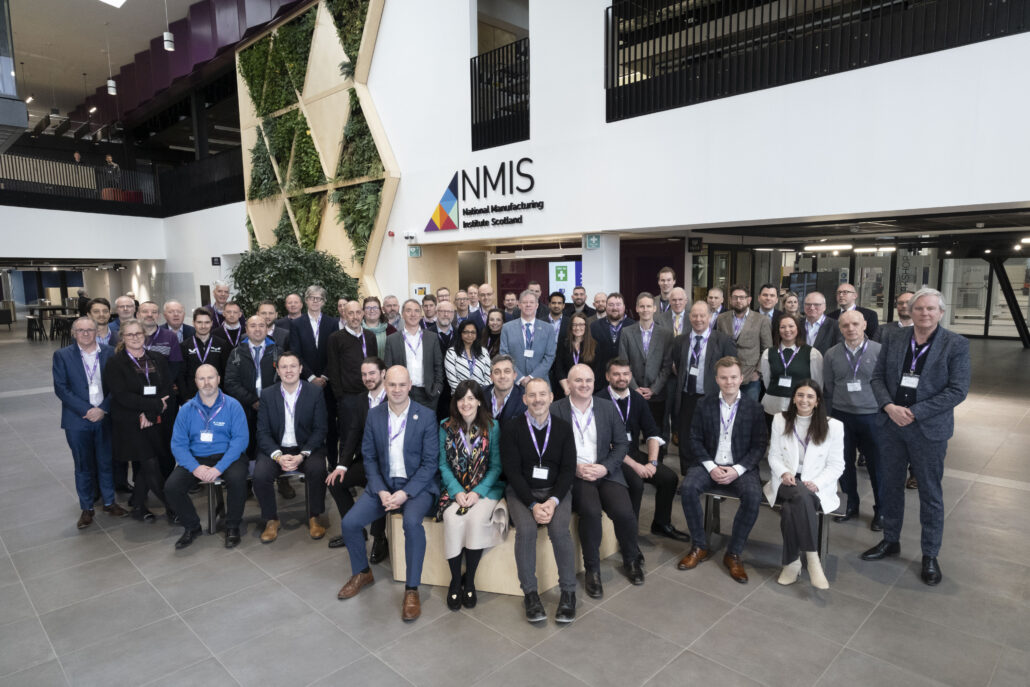Flexi Job Roles
February 12, 2024Clyde Training Solutions announce build of new safety training centre at Westway
February 13, 2024More than 100 attendees at UK’s first aviation-based hydrogen summit told infrastructure to support zero-emission flight at Glasgow Airport could be ready within three years –
Attendees at the Glasgow Airport Hydrogen Innovation Hub summit held yesterday (Thursday 8 February) heard that the infrastructure needed to support zero-emission flight could be in place as early as 2027.

The first-of-its-kind aviation hydrogen summit, held at the National Manufacturing Institute Scotland (NMIS), brought sector leaders in aviation, finance, aerospace, renewables and engineering from across the world together with academia and government.
A consortium led by Glasgow Airport and net zero consulting co-developer Ikigai Group was set up in May last year thanks to funding from the Scottish Government’s £7-million Hydrogen Innovation Scheme, which aims to support the development of renewable hydrogen technologies.

The Glasgow Airport Hydrogen Innovation Hub consortium was tasked with delivering a feasibility study to determine the most efficient, bankable, green hydrogen production, storage and refuelling solutions, and to assess the operational feasibility of a multi-modal hydrogen hub at the airport.

The interim results of the study were presented to more than 100 attendees at the summit. This included an update that the development phase to generate, store and distribute hydrogen could commence this year with the objective of the hub being ready to support zero-emission flights at Glasgow Airport by 2027.
Jon Matthews, Group Head Capital Investment and Planning at AGS Airports, which owns Glasgow Airport, said: “Yesterday’s hydrogen innovation summit was a resounding success. Hydrogen is becoming an increasingly viable option for regional and short-haul aircraft, which is why Glasgow – an airport that serves many of Scotland’s rural and island communities – is the perfect testbed.
“By bringing such a diverse range of industries and innovators together, we were able to discuss in detail the tangible progress already being made towards the creation of a hydrogen production, storage and distribution hub at Glasgow Airport, and crucially the next steps to deliver the project.
“Significant progress on hydrogen-powered aircraft has been well documented and rightly so, but equally important is the huge amount of pioneering work being undertaken at ground level to ensure the challenges and opportunities involved in creating the infrastructure required to support zero-emission flight are addressed and realised.”
A key part of the study was to consider how the hydrogen hub at Glasgow could not only be replicated at AGS Airports’ other airports in Aberdeen and Southampton airports, but also around the world.
The project aims to create a blueprint that would future-proof regional airport operations by combining an onsite energy hub with distribution to the variety of local users. These would include aircraft and ground handling equipment on the airfield and landside vehicles such as vans, trucks and buses operating across the terminal and beyond.
Helena Anderson, co-founder of Ikigai, said: “We recognize the pivotal role of airports as multi-modal energy hubs. This feasibility study is a world first, modelling and designing how to deliver scalable and commercially viable onsite green hydrogen to a variety of transport applications in and around Glasgow Airport.
“Glasgow is one the best airports to start this ambitious project because it will have private wire solar, back-to-base flights and local hauliers and buses, allowing them to be first movers in the conversion to hydrogen. Moreover, this feasibility study shows that it is possible, in those circumstances, to sell green hydrogen at price parity with fossil fuels.”
It is this multi-modal approach, combined with the unique potential of Glasgow Airport’s back- to-base routes, and Scotland’s ambitious plans for a dedicated hydrogen network, that make Glasgow the best place to start delivering the future of flight.
The Glasgow Airport Hydrogen Innovation Hub brings together a multi-disciplinary and international consortium, including H2GO Power, Ricardo, Altrad Babock, ZeroAvia, OG Clean Fuels, University of Glasgow and Scottish Water Horizons, supported by Loganair, easyJet and British Airways and other airport energy users.
Scottish airline Loganair last week signed a Memorandum of Understanding with leading zero-emission flight specialists ZeroAvia to start supplying hydrogen planes from 2027.
Andy Smith, Head of Sustainability Strategy at consortium partner Loganair, said: “We are pleased to be part of the Glasgow Airport Hydrogen Innovation Hub, which is making cutting edge progress in developing solutions to hydrogen’s use in aviation.
“Hydrogen fuel is expected to play a significant role in decarbonising flights from airports like Glasgow in the coming decades and it has a particularly important role to play in Loganair’s future domestic network.
“We are proud to be a part of the consortium and look forward to the next steps in demonstrating how hydrogen can be safely stored and distributed at a busy hub like Glasgow.”
Yesterday’s summit also created an opportunity for key stakeholders to provide practical feedback on the initial study findings and to commit to working with Glasgow Airport and Ikigai to build a hydrogen aviation network.
Scottish Government Energy and the Environment Minister Gillian Martin said: “This project is driving technological progress and advancing innovation. With our abundant renewable energy resources, we are seeking to become one of Europe’s leading producers and exporters of hydrogen.
“We are also working to decarbonise scheduled flights within Scotland by 2040. I hope that the learning from this project will bring the possibility of commercial hydrogen flight ever closer.”



